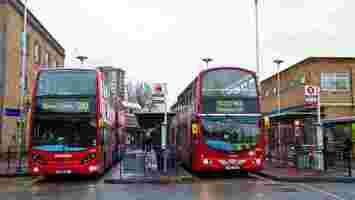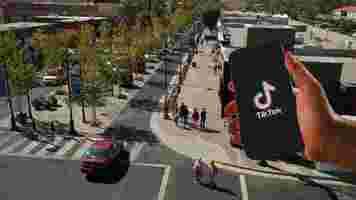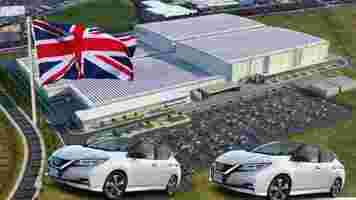UK is spending £3B to completely overhaul its bus system
This article was originally published by Christopher Carey on Cities Today , the leading news platform on urban mobility and innovation, reaching an international audience of city leaders. For the latest updates follow Cities Today on Twitter , Facebook , LinkedIn , Instagram , and YouTube , or sign up for Cities Today News.

UK Prime Minister Boris Johnson has announced plans to invest £3 billion (US$4.18 billion) in bus services across England, including the roll-out of 4,000 new British-built electric or hydrogen buses.
As part of the investment, the government has pledged to introduce hundreds of miles of new bus lanes, provide more weekend and evening services and introduce contactless payments on all buses.
Price caps on tickets and more frequent services are also promised in what the Department for Transport (DfT) describes as “the most ambitious shake-up of the bus sector in a generation”
‘Turn up and go’ services
Commenting on the announcement, UK Transport Secretary Grant Shapps said: “Buses are this country’s favourite way of getting around. They help us get to school, to the GP, or to the shops – but services across England are patchy, and it’s frankly not good enough.
“The quality of bus service you receive shouldn’t be dependent on where you live. Everyone deserves to have access to cheap, reliable and quick bus journeys.
“The strategy we’re unveiling today will completely overhaul services, ensuring we build back better from the pandemic. Key to it is the new deal it offers to councils – we will provide unprecedented funding, but we need councils to work closely with operators, and the government, to develop the services of the future.”
The DfT said it expected to see local authorities and operators working together to deliver bus services so frequent that passengers could just “turn up and go” – no longer needing to rely on a traditional timetable or wait more than a few minutes.
Laura Shoaf, Chair of the Urban Transport Group and Managing Director of Transport for West Midlands (TfWM), welcomed the announcement, saying the strategy had a “positive and ambitious” vision for the future.
“Prior to the pandemic, bus use and bus networks were in decline and fares were increasing – so the additional funding pledged by the Government is welcome,” Shoaf said.
“There can be no green and just recovery from the pandemic without better bus services so the bus will continue to need a bigger slice of overall transport spending and for this funding to be sustained over the long term,” she added.
Criticism
The plan has been criticized by unions and the opposition Labour party, however, who pointed to falling passenger numbers and previous cuts to services.
“This so-called strategy offers nothing for those who were looking for a bold vision to reverse the millions of miles of bus routes lost across the country,” said Labour’s Shadow Bus Minister Sam Tarry.
“People will be wondering when they return to work whether there will be enough affordable and regular buses for their daily commute.”
“The Government must do more to protect this crucial sector – not least given we’ve already seen more than 1,000 jobs lost in the bus and coach manufacturing industry alone since the pandemic started,” Tarry added.
Franchising
Outside of London, England’s city bus services are run by various private firms, with multiple companies operating in some cities.
This means passengers can often end up paying multiple fares if they need to change buses during a trip.
Under the Transport for London (TfL) network, users pay a flat fee of £1.50 which covers all bus journeys taken within one hour, meaning passengers can change multiple times without incurring more fees.
Some cities, including Manchester, have floated the idea of introducing bus franchising across the city region, which would scrap the current privately operated system.
An Ipsos Mori-led consultation on the plans held between December 2020 and January this year garnered more than 12,500 responses, 82 % of which were in support of a franchising model, according to the Greater Manchester Combined Authority.
Greater Manchester Mayor Andy Burnham is set to consider whether to proceed with the franchising plan over the coming weeks, and if approved, the model could be rolled out in three phases with one sub-area of the city region introduced each year between 2023 and 2025.
Do EVs excite your electrons? Do ebikes get your wheels spinning? Do self-driving cars get you all charged up?
Then you need the weekly SHIFT newsletter in your life. Click here to sign up .
This video shows how amazing cities could be if they prioritized people over cars
Now don’t get me wrong, cars are great, brilliant even. Offering luxury, flexibility, and comfort, they are the pinnacle of personal transportation. But as towns and cities get busier, and space comes at more of a premium, they don’t mix so well with the humble automobile. Cities full of cars end up not being quite friendly to pedestrians, cyclists, and public transit, and TikTok shows us how.

In an attempt to reconfigure this hierarchy, cities around the world are now reclaiming space previously given to the car, and handing it back to other forms of transport.
Not everyone is pleased about this. Usually, it’s cantankerous car drivers who think they own the road that proclaim giving space to cyclists increases congestion, and removing parking spaces will negatively impact local businesses.
In reality, this isn’t actually what happens. Taking space away from cars and giving it to bikes doesn’t increase congestion , we’ve been building more and more roads in our cities for decades, and congestion is still pretty bad. You build more space for cars, guess what fills them up? Yep, cars.
What’s more, removing parking doesn’t negatively impact business. In fact, creating a safe space for pedestrians and cyclists helps local business, as people are more inclined to wander, browse, and enjoy the area when there are fewer cars ruining the atmosphere.
As Bloomberg pointed out back in 2015 , pretty much every study that’s been done on whether removing car parking space negatively impacts local business revenue has found that it doesn’t.
But what does all this actually look like? Talking about reconfiguring roads for bikes and walkers is one thing; what happens when these design philosophies are put into practice? Thankfully, TikTok account TalkingCities is here for us.
As TalkingCities shows us on TikTok, removing space from cars and giving it to pedestrians and cyclists doesn’t negatively impact the local area. In fact, it creates a space that is more welcoming and helps boost the local economy.
The example in the video shows how a sprawling, ugly, dirty ive lane highway that cuts through the middle of a city (in this case Lancaster, California) can be reconfigured to build a space that is enticing enough to bring out nearly one third of the city’s residents for events. Lancaster is home to around 156,000 people, and some 30,000 people attended an event held in a space that was previously just tarmac.
The city spent $11.5 million on the project, and within four years attracted $130 million in private investment, and created $273 million in economic output.
Restructuring Lancaster’s downtown area has brought in nearly 50 new businesses, more than 800 permanent jobs, and 1,100 construction jobs. Three years after the city was restructured, motor vehicle collisions fell by 38%, and injury crashes have fallen by 49%.
So no, removing space for cars, and handing it to cyclists and pedestrians, doesn’t ruin our cities. It makes them more fun, it helps them thrive and become more prosperous, best of all, it makes them safer.
Do EVs excite your electrons? Do ebikes get your wheels spinning? Do self-driving cars get you all charged up?
Then you need the weekly SHIFT newsletter in your life. Click here to sign up .
UK to get its first battery gigafactory as part of Nissan’s $1.4B investment plan
Japanese car giant Nissan has invested $1.4 billion in an EV hub in the UK, to supercharge its European electric future and give a massive boost to the British automotive industry.

The company announced today its plan to build a huge battery plant in Sunderland that is said to produce 10,000 vehicles per year, including a new-generation electric crossover.
Nissan has partnered up with the Chinese battery tech company Envision AESC and Sunderland City Council on the project.
The plant itself will be built by Envision, which will invest $621 million to manufacture what will be the UK’s first gigafactory. Strategically placed next to Nissan’s plant in the same area, it will support the automaker’s battery supply.
The new gigafactory will have an initial capacity of 9GWh, but could reach up to 25GWh by 2030 with a potential future $2.5 million investment by Envision.
Nissan itself will put down $584 million to produce its new EV crossover at its adjacent plant, where it now manufactures its LEAF and the Qashqai crossover SUV.
To help the first phase of the project, Sunderland City Council will create a $110 million local energy grid to provide 100% renewable electricity to the site. To that end, the grid will harness power from wind farms, solar parks, and a dedicated energy storage facility made from second-hand electric car batteries.
Apart from the 6,200 jobs the project promises to create, the UK has a lot to win from Nissan’s plan. Prime Minister Boris Johnson’s comments are indicative:
The new gigafactory comes at a critical moment for the UK, which needs to enhance its battery production and supply, if it wishes to remain an investor-friendly option for car companies aiming to export to the rest of Europe.
Although the EU allows the post-Brexit UK the free trade of cars, there’s a significant catch: a t least 40% (rising to 55% in 2027) of the value of parts in a finished car that is exported to the bloc, must be produced in the UK or EU.
Given that the battery makes up half of an EV’s price, importing it would mean that the EU market would be off limits, making domestically made batteries the only option.
Similarly, a UK-based plant immensely benefits Nissan, whose adjacent car factory in Sunderland exports 70% of its units to mainland Europe.
Do EVs excite your electrons? Do ebikes get your wheels spinning? Do self-driving cars get you all charged up?
Then you need the weekly SHIFT newsletter in your life. Click here to sign up .